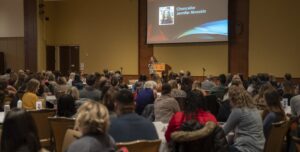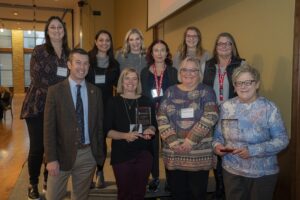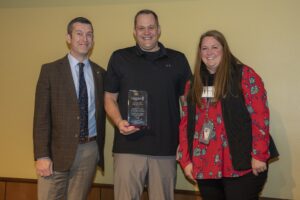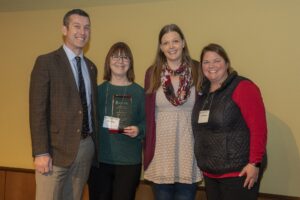
Chancellor Jennifer Mnookin and Vice Chancellor of Finance and Administration Rob Cramer addressed the HR community during the lunchtime plenary, reiterating the importance of the HR community in supporting a positive campus climate and culture, as well as in enabling the university to navigate change and uncertainty while continuing to meet the university’s mission and objectives.
Chief Human Resources Officer Patrick Sheehan also spoke, commenting that he couldn’t “help but to reflect on how the HR function on our campus has changed over the past 13 years. I often think to myself, ‘this is the biggest change that we will encounter as a campus’ and I am continually proven wrong!” He offered examples, including “the leap into the future” that HRS was, as we now engage in Workday implementation, which provides an opportunity to reimagine how we conduct our work on this campus, and across the UW System.
“At each juncture,” Patrick said, “we come together, acknowledging that changes are occurring, pulling together as a community, and ensuring that the outcomes are positive, so that changes [drive] the organization to a better future.” He emphasized that no change effort is managed by any one individual—but rather the result of pulling together as a community.
Thus, for the 2022 Partner Awards, the Office of Human Resources (OHR) highlighted teams that modeled how to navigate the extraordinary challenges of the past three years in consultative partnership.
What is HR partnership?
Award-winning partnership behaviors in HR@UW include:
- Working to ensure the success of one’s organization
- Demonstrating strategic thinking
- Engaging in process improvement
- Demonstrating ‘partnership attributes’ such as humble inquiry (coined by MIT professor Edgar Schein)
Who was nominated?
Thirteen (13) teams were nominated, primarily by divisional and departmental leadership. Nominations (in the order they were received) included:
- ASU: Austin Tamayo, Anne Bartholomew Yorde, Dan Roen, Michele Blakeman, Kayla Eckerty, Meghna Shah, Emma Sippel, Daniel McCusky, Phoua Khang, Leticia Krumscheid, Nicole Mootz, and Theresa Neisius (nominated by Eva Armour-Esser, ASU)
- UWPD: Tracey Berman, and Mark Silbernagel (nominated by Kristen Roman, Chief; Kari Sasso and Brent Plisch, Assistant Chiefs, UWPD)
- School of Vet Med/UW–Veterinary Care: Nancy Parkinson, Karlye Wolff, Meenu Verma, and Kate Hawley (Nominated by Edward Rodriguez, Associate Dean for Budget, Finance, and HR, and Mark Markel, Dean, School of Veterinary Medicine; and Christopher Snyder, Associate Dean for Clinical Affairs, School of Veterinary Medicine–UW Veterinary Care)
- DoIT: Jeff Palkowski, Marissa Isensee, and Charissa Weber (nominated by Holly Weber, DoIT HR)
- SMPH: Lily Kramer, Tina Manke, Nadean Marron, Tina Petrick, and Ruth Boynton (nominated by Sue Carlson, Chief Administrative Officer for the Department of Biostatistics and Medical Informatics, SMPH)
- DoIT: Adam Fermanich, Lorelei Fries, Marissa Isensee, Hope Jende, Jenny Kvistad, Jeff Palkowski, Katelyn Spanbauer, Mandy Stib, Charissa Weber, Holly Weber (nominated by Lois Brooks, Chief Information Officer & Vice Provost for Information Technology, and David Pagenkopf, Deputy Chief Information Officer, DoIT)
- DEM: Ann Bradshaw, Paula Gates, Kelly Layton (nominated by Jeremy Traska, Director for Administration and Chief Financial Officer; Cori Splain, Director for Strategic Initiatives and Chief of Staff; Andre Phillips, Director of Admissions and Recruitment; Helen Faith, Director of Student Financial Aid; and Scott Owczarek, Associate Vice Provost and University Registrar, DEM)
- OHR, UHS, WI Union, Athletics: Jessica Karls-Ruplinger, Lauren Bowers, Leanne Morris, Erica Fini Martin, Liz Valentine, Lili Gagliano, Tim Borchert, and Craig Hanson (nominated by Anna Vembu Julian, OHR)
- SMPH: Jena Yohann, Patrick Hanson, Charles Amble, Kassie Hefty, Michelle Rindal, and Chanel Vang (nominated by Sharon Gehl, Clinical Science Associate Department Administrator, Department of Medicine, SMPH)
- School of Nursing: Brenda McFarland, Chris Cowdrey, and Heather Mace (nominated by Heather Mace, Administrative Assistant; Darby Sugar, Director of Advising Services; Lisa Reese, Facilities Associate Director; and Max Schmidt, Financial Specialist, School of Nursing)
- UHS, OHR, ASU: Lynn Sullivan, Liz Valentine, Lili Gagliano, Lauren Bowers, Marci Birkes, Erica Fini-Marten, Leanne Morris, Anna Vembu Julian, and Anne Yorde (nominated by Jake Baggott, Executive Director, AVC Student Affairs, and Carol Griggs, Associate Executive Director, UHS)
- ASU: Meghna Shah, Dan Roen, and Anne Yorde (nominated by Colleen Godfriaux, Nelson Institute)
- Law School: Bethany Pluymers, Justin Boehm, and Kelly Hallmark (nominated by Dan Tokaji, Dean, Law School)
The Jury
The jury was led by former HR Partner Award winners: Julie Karpelenia, Kristine Schutte, and Kim McFarlane. Former winner Ann Bradshaw was recused from the jury because she was nominated as part of a team. Other award jury members included Patrick Sheehan and HR Communities of Practice Team.
The jury looked closely at the examples provided for each of the four categories of “consultative partnership” and their respective criteria, using a scoring rubric. Still, the decision was difficult. There is much to celebrate among this year’s nominees and their contributions over the past three years.
While the intention was to distribute two awards, three nominations included an abundance of clearly articulated examples in all four categories and the majority of the criteria within each category—thus it was decided to award three teams.
And the 2022 winners are…
(Team 1) The following nine individuals worked across UW units as one united team. They were nominated by Jake Baggott, Executive Director and Associate Vice Chancellor of Student Affairs of UHS, and Carol Griggs, Associate Executive Director of UHS:
- Liz Valentine and Lynn Sullivan (UHS)
- Lili Gagliano (from UHS at the time—now ASU) and Anne Yorde (ASU)
- Anna Vembu Julian, Erica Fini-Marten, Lauren Bowers, Leanne Morris, and Marci Birkes (OHR)

The context: University Health Services (UHS) was tasked with supporting the UW–Madison COVID response as students returned to campus in the fall of 2020 and UHS HR needed to rapidly scale up staffing to meet testing, tracing, and vaccination needs for the university in order for the university to allow students and staff to return to in-person instruction. The three person UHS HR staff hired over 230 people from July-December 2020 while maintaining other HR requirements.
The challenges: Although the UHS team accomplished a great deal in the fall of 2020, it became evident that the need to staff-up testing, tracing and vaccinating wasn’t going to go away, and would only increase as the spring semester started and new requirements were implemented.
The teamwork: A partnership was developed between UHS and OHR to ensure adequate staffing levels. This partnership brought the strength of the campus HR community into the response effort and amplified customer-service to the wider campus. OHR took on the interviewing and background checks, while UHS managed the orientation and scheduling of training. HR community members from outside OHR answered the call to assist with interviews. They screened 1,586 applicants and conducted 789 interviews for the 2020-2021 spring semester.
The team built a custom job application to facilitate an easier application process. Applicants shared that this was the most straightforward process they’d experienced. UW was competing with many other organizations for testers and vaccinators. Ensuring a positive candidate experience that was also incredibly efficient was top priority in order to secure the talent.
UHS shifted practices: from starting staff at the beginning of a pay period to accommodating multiple start date options; from traditional, in-person orientations to virtual orientations; from a single point person for background checks and TL security to enabling orientation facilitators to complete the whole workflow, thus avoiding bottlenecks. When bottlenecks arose, processes were reviewed, and options developed. New ideas were encouraged and valued. Success was everyone’s top priority.
UHS worked with OHR to get training sessions added to the online course catalogue and new hires were directed to sign up. They only needed to contact HR if there was not a time slot that worked for them, freeing up HR staff for other activities.
The challenge of verifying I-9 documents was solved by following orientation sessions with a block of time and assigning new hires time slots to join the meeting and share documentation.
UHS and OHR maintained regular communication throughout the team’s life cycle, allowing for quick assessment and resolution of problems. The willingness of all team members to share information and accept feedback proved to be essential.
This cross-unit team came together as an example of what can be accomplished when you build relationships and look to those relationships in challenging times.
(Team 2) The following two individuals worked strategically and modeled partnership attributes throughout the pandemic. They were nominated by UWPD Chief Kristen Roman and Assistant Chiefs Kari Sasso and Brent Plisch:
- Tracey Berman (UWPD)
- Mark Silbernagel (UWPD)

The context: While not the largest division at UW–Madison, UWPD is one of few that maintains 24/7 onsite staffing. During the pandemic, maintaining an essential 24/7 function was especially imperative.
The challenges: The normal level of work for the DDRs at UWPD is fairly steady to begin with between work injuries, FMLA and accommodations—but during the pandemic the demand on UWPD’s Division Disability Representatives (DDR) skyrocketed. At the same time, many UWPD staff, who had been hourly due to mandatory overtime (for event staffing beyond regular work hours), were transitioned from hourly to salaried. This was a giant culture shift for UWPD.
The teamwork: While the various facets of the department were focused on serving the community in very uncertain times, Captain Mark Silbernagel and HR Manager Tracey Berman dug in and focused on assuring that UWPD employees were taken care of. They quickly updated all UWPD policies to assure best practices in keeping UWPD staff safe and healthy. They established cleaning standards and protocols and procured items to assure the protocols could be carried out during a time of questionable supply chains.
Often spending significant time outside of traditional work hours to answer questions and calls from employees working on other shifts, both Mark and Tracey dedicated significant time and effort to make sure the team felt comfortable asking questions about policy and HR changes, enabling employees to continue to serve campus while knowing their own needs were met.
Tracey and Mark had the trust and relationships with UWPD’s staff to assure positive COVID cases among employees were quickly reported to the department, which allowed UWPD to contract-trace and decontaminate workspaces and squad cars quickly. UWPD leadership felt that they would not have been able to maintain work shifts if employees hadn’t had confidence and trust in Mark and Tracey.
Additionally, both Tracey and Mark were heavily involved in the Title and Total Compensation Project (TTC). While writing new standard job descriptions, they recognized the impact that TTC would have on the culture of UWPD and community partners related to the management of larger events (e.g., football games, EOC activations, protests, VIP visits). They developed a plan to ensure that TTC implementation would go smoothly, and subsequently communicated with employees individually as well as through department notifications—essentially doing everything in their power to make this shift as painless as possible.
Tracey and Mark also prepared supervisors, managers and leadership for the change. They engaged in significant educational efforts and facilitated long discussions and debates about how to proceed. No matter the conversation, Tracey and Mark kept best intentions for UWPD employees in mind. Their process empowered many UWPD supervisors to tackle TTC questions on their own, reaching out only when they needed clarification. Tracey and Mark’s early vision related to TTC’s impact was vital to the success of the process.
The care and compassion that Tracey and Mark extended to UWPD employees was herculean—and they did it in the spirit of treating UWPD employees as family members.
(Team 3) The following three individuals consistently go beyond transactional HR to foster organizational effectiveness. They were nominated by Enrollment Management’s Director for Administration and Chief Financial Officer Jeremy Traska; Director for Strategic Initiatives and Chief of Staff Cori Splain; Director of Admissions and Recruitment Andre Phillips; Director of Student Financial Aid Helen Faith; and Associate Vice Provost and University Registrar Scott Owczarek:
- Ann Bradshaw (DEM)
- Paula Gates (DEM)
- Kelly Layton (DEM)

The context: The student-facing Department of Enrollment Management (DEM) formed a COVID response team, in addition to managing the common challenges of unexpected furloughs, budget reductions, TTC and single payroll implementation, and the shift to remote work.
The challenges: During UW’s early COVID-19 response, DEM units developed their own expectations related to remote work. With regard to TTC, units previously made compensation decisions in isolation based on a single metric (“Years in Job”), and DEM HR simply processed units’ decisions.
The teamwork: When it became clear that DEM units were developing inconsistent expectations related to remote work, Ann, Paula and Kelly, who make up the DEM HR team, intervened to craft consistent guidelines and expectations for the entire division that adhered to UW’s remote work policy. They engaged DEM units to discern remote work needs, ordered necessary equipment (e.g., laptops, monitors, docking stations), and set up multiple video conference rooms, which prepared DEM for a smooth and stable transition to remote and hybrid work. In hindsight, their proactivity proved critical as later supply chain issues eventually resulted in devastating delays that thankfully did not impact DEM’s work.
Ann, Paula, and Kelly were instrumental in the development and execution of a DEM-specific Compensation Study, which provided objective data on DEM’s current compensation landscape compared to their four related and distinct markets. Instead of a single metric (“Years in Job”), DEM HR developed a comprehensive rubric that assessed knowledge, skills, abilities; independence, responsibilities; performance; and years in role for a more holistic assessment, leading to more informed conversations on fair compensation.
“DEM HR was able to ease [the TTC] challenge by creating templates and processes to ensure that supervisors and directors agreed on the TTC decisions. They were also fierce advocates related to potential impacts of TTC policy changes and did their best to protect both divisional and team member interests. As evidence of their valuable role in our process, there were only a handful of appeals and all were successfully resolved. They were kind, professional, knowledgeable, and objective throughout the process of guiding our team through this change.” -Helen Faith, Director of Student Financial Aid
DEM HR is not just a transaction unit, but one that shapes organizational efforts to increase divisional competitiveness and efficiency. Ann, Paula, and Kelly clearly enjoy being a customer-oriented unit.
- To address timely HR topics, they initiated a “DEM Sessions” series, open to all DEM employees to learn and ask questions related to topics such as furloughs, benefits, COVID response, FMLA/WFMLA, tuition reimbursement, parking and more.
- They advocated for offering executive coaching and 360 divisional leadership reviews. This led to increased leadership competencies and properly developed professional growth plans.
- They led the effort to create a campus contract that DEM units could utilize to reduce procurement burden.
- Instead of serving with a passive “open-door” philosophy, the team actively seeks opportunities to learn more about the tasks and responsibilities of team members across the division. They volunteer extensively for divisional events and provide student-service reception coverage during staffing shortages.
Their work has gained them a reputation as approachable and a trusted resource for guidance. DEM HR demonstrates that a deeper and proactive understanding of the organization’s functions leads to trust and collaboration.
Congratulations!
The Office of Human Resources congratulates all nominees and winners! Winners will receive complimentary admission to the 2023 HR@UW Conference.
Hold the date for next year’s conference and award ceremony: Wednesday, December 13, 2023